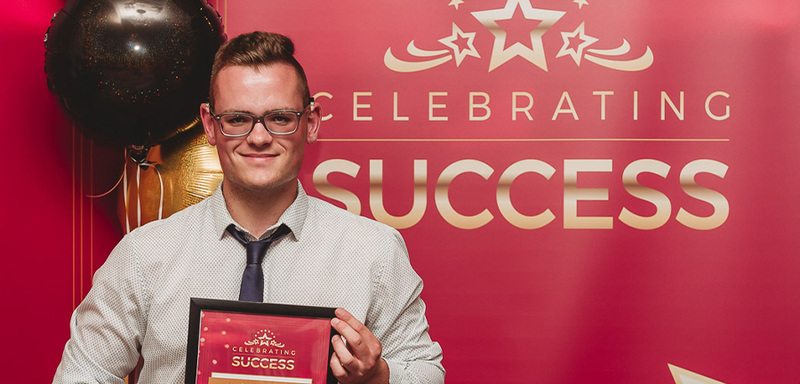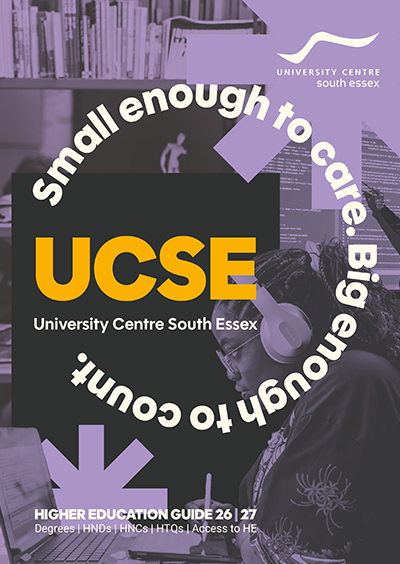Level 6
Special Educational Needs and Disability Studies BA (Hons) - Full Time
| Duration | Age Group | Study | Start | Cost | Available Locations |
|---|---|---|---|---|---|
| 3 YEARS | ADULT | FULL TIME |
15/09/2026 |
£9,535 per year * | Southend Campus, Thurrock Campus |
| Duration | Age Group | Study | Start | Cost | Available Locations |
|---|---|---|---|---|---|
| 3 YEARS | ADULT | FULL TIME |
15/09/2026 |
£9,535 per year * | Southend Campus, Thurrock Campus |
Share On
Overview
Course code: X161
This course is validated by the University of East Anglia (UEA)
This programme is for those looking to progress to teaching, social work or management in the special education and social care sectors and will give you the skills and knowledge you need to create safe, stimulating and supportive learning environments.
Why study this degree at University Centre South Essex?
- You will undertake valuable work placements that are linked your assessments
- Placements often lead to employment
- No exams, assessment is observation based, essays, research projects, presentations, MCQ Exams, Short Answer Tests, Portfolios
- The flexibility of the course allows you to balance other commitments
The BA (Hons) Special Educational Needs and Disability (SEND) Studies degree provides you with the theoretical and legislative skills that allow you to work in a variety of educational and care settings supporting those with specific needs (including learning disabilities, physical disabilities and mental health issues). The programme includes a work placement which will enable you to apply what is learnt in the classroom to the workplace environment and vice versa. This will give you the opportunity to share practice and experience throughout the degree.
The course will allow you to become familiar with workplace policies and to be aware of how these are put into practice. You will become familiar with a range of tools for assessing needs and the type of strategies and resources that may be used to support those with various needs. You will also learn to understand the skills required to gather and utilise evidence in order to underpin, support and evaluate practice.
This course is also available as a Certificate of Higher Education (Level 4) which follows year 1 and 2.
Please note: this course is also available as a PART TIME course.
Entry Requirements
A minimum of 64 UCAS points from one or more of the following:
- Access to Higher Education Diploma
- A Levels
- T Levels
- BTEC/UAL Extended Diploma
- Foundation Diploma in Art and Design (Level 3 or 4)
- Or equivalent EU/International qualifications, such as International Baccalaureate Diploma
- GCSE English Language and Maths at Grade C (old specification) or Grade 4 (new specification) or above OR a Level 2 equivalent such as Functional Skills.
This list is not exhaustive, other qualifications may be considered. Entry to this course will also be determined by the quality of your application, looking primarily at your portfolio/showreel of work,
personal statement and reference.
Entry to this course will also be determined by the quality of your application, personal statement and reference.
DBS (Disclosure and Barring Service)
All successful applicants for this course must undergo an enhanced Disclosure and Barring Service (DBS) check in Year 1 prior to starting placement. The cost of the initial DBS check is included in the course fees.
DBS identification documents are verified by trained staff in line with DBS guidelines as part of the admissions process.
Important: Disclosure and Barring checks cannot be carried out for applicants who are not or have never been resident in the UK Applicants who reside or previously have resided overseas will be required to provide a criminal record check or certificate of good conduct from their country or countries of residence prior to entry on to the course.
Disclosure and Barring Service
Exceptional Entry
Applications from mature students who do not possess the entry requirements as listed above, but who possess related professional experience or professional qualifications, are welcome to apply. You will need to demonstrate by interview, exceptional entry portfolio (this is likely to include evidence of paid or unpaid work experience) and/or written assessment that you are suitable for the course. In the first instance we suggest you contact HEAdmissions@southessex.ac.uk to discuss your application.
Course Structure
Full Time course
Year 1 (Level 4)
- Introduction to theoretical perspectives in education and disability studies
- Legislation and policy for SEND
- Introduction to specific needs
- Policies, their procedure, and practice in workplace setting
- Effective working practices
- Introduction to SEND inquiry.
Year 2 – (Level 5)
- Identifying and Supporting Individual Needs
- Understanding Autism And Neuro-diverse Needs in practice
- Developing and Delivering Learning Support Programmes
- Action Research
- Educational Inquiry
- Language Development and SEND Practice
Year 3 – (Level 6)
- Workplace Based Project
- Continuing Personal and Professional Development (CPPD)
- Practice and Digital Innovation in SEND
- Exploring Wellbeing and Mental Health in Childhood and Adolescence
- Protection and Vulnerability
Work Placement
Work placements are necessary during every year of the course.
Teaching & Learning
Teaching
You will be taught through a combination of lectures, seminars and workshops, which enable you to discuss and develop your understanding of Independent learning. You will have 13 hours of contact time per week across two days. Contact time will consist of:
- 2-4 hour lectures/seminars
- Tutorial and dedicated one-to-one support when necessary
Independent learning
When not attending lectures, seminars or workshops or other timetabled sessions you will be expected to continue to learn independently through self-guided, independent activities. This may typically include reading journal articles, books, periodicals and preparing coursework and presentations. A range of excellent facilities, including the library and online learning resources, the Learning Resource Centre and the Forum supports your independent learning.
Assessment & Feedback
You will be assessed using a variety of methods including:
- Essays
- Research Projects
- Presentations
- Short Answer Tests
- Portfolios
No exams required.
Feedback
You will receive formative feedback as part of your modules and taught sessions with your module lead. You will also receive summative comments on all formal assessments undertaken by coursework. Written feedback is provided to students within 20 working days of submission through Turnitin.
Course Cost
Adult,
full_time:
£9,535 per year
Fees are per academic year for Home/UK students.
Additional course costs can be found here
What Next...
Possible career routes include teaching in primary school, special needs schools and the post-compulsory sector. Graduates teach in schools designated for children with mild and severe learning disabilities, or managing special units, community care centres or training centres. This degree also prepares you for employment in a wide range of other social care or educational settings.
Students wishing to pursue further study may continue at postgraduate level or continue in vocational training at another institution.
Graduate destinations
Previous graduates have gone on to the Primary SCITT programme and then into teaching, PGCE and teaching in life long learning sector, Masters in Social Work and social work practice, Mental health, Care management, student support services, Pastoral management, managing behavioural units, working in a pupil referral unit and where an Early Years practitioner qualification (level 3) has been held into Early Years (0-5 years) SEND role.
Graduates frequently undertake postgraduate study, including a MA in Social Work. Recent graduates have taken up management positions in special needs schools, whilst another now manages a children's unit. However, the great majority undertake teacher training, mainly through Essex and Thames Primary SCITT.
Success Stories...

Celebrating Success 2022: Billy Gibbons
Course studied
Special Educational Needs and Disability Studies BA (Hons) - Full Time
I would recommend people to look at University Centre South Essex, especially if you have a disability as there is good access and amazing support.
UEA Student of the Year, Billy Gibbons, won his award for his determination to succeed in spite of the challenges he faces.
Billy has significant speech and language delay, developmental delay and an auditory processing impairment. He communicates using ‘total communication’ which combines British Sign Language, lip reading, speaking and listening. He also has mild cerebral palsy affecting mainly his lower limbs.
His tutors have praised him for not letting barriers get in his way and for always striving to achieve his best.
Billy said he was ‘very proud’ to have won the award.
He said: “I knew I would be very committed and determined to do my very best this year and very thankful to be recognised by my tutors for this.”
Billy was quick to recognise and praise the ‘excellent’ support he is receiving, which was one of the reasons he chose to study at the university centre.
He added: “I wanted to study at University Centre South Essex because there was opportunity for me to keep the fantastic support I had had during my time on my Further Education course at the college.
“I would recommend people to look at University Centre South Essex, especially if you have a disability as there is good access and amazing support.
Billy’s ambition is to complete his degree, something he has been working towards and dreaming of since he was young.
He said he also wants to become a role model for other students who believe they can’t go to university when in fact they can.


